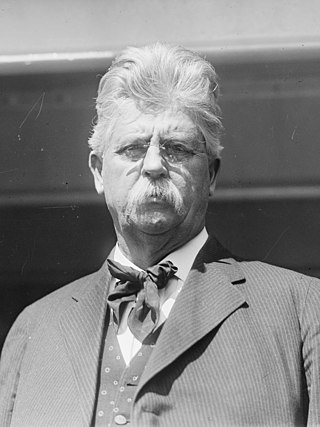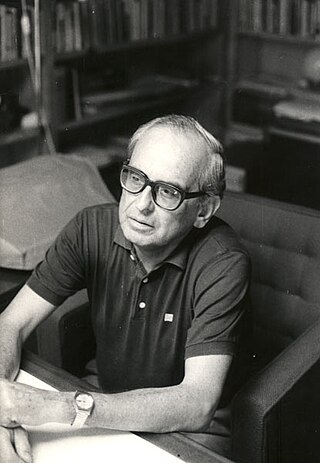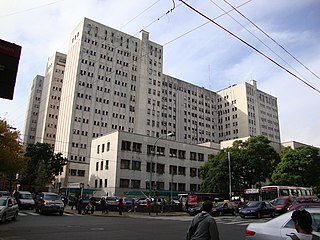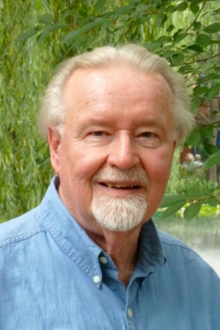
The University of California, San Francisco (UCSF) is a public land-grant research university in San Francisco, California. It is part of the University of California system and is dedicated entirely to health science and life science. It conducts research and teaching in medical and biological sciences.

Bernardo Alberto Houssay was an Argentine physiologist. Houssay was a co-recipient of the 1947 Nobel Prize for Physiology or Medicine for discovering the role played by pituitary hormones in regulating the amount of glucose in animals, sharing the prize with Carl Ferdinand Cori and Gerty Cori. He is the first Latin American Nobel laureate in the sciences.

Henry Tifft Gage was an American lawyer, politician and diplomat. A Republican, Gage was elected to a single term as the 20th governor of California from 1899 to 1903. Gage was also the U.S. Minister to Portugal for several months in 1910.

James Duval Phelan was an American politician, civic leader, and banker. He served as nonpartisan Mayor of San Francisco from 1897 to 1902. As mayor he advocated municipally run utilities and tried to protect his constituents from the monopolistic practices of the trusts. He represented California in the United States Senate from 1915 to 1921 as a Democrat. Phelan was a progressive supporter of the policies of Woodrow Wilson and was a leader in the movement to restrict Japanese and Chinese immigration to the United States.

The Hôtel-Dieu is a public hospital located on the Île de la Cité in the 4th arrondissement of Paris, on the parvis of Notre-Dame. Tradition has it that the hospital was founded by Saint Landry in 651 AD, but the first official records date it to 829, making it the oldest in France and possibly the oldest continuously operating hospital in the world. The Hôtel-Dieu was the only hospital in the city until the beginning of the 17th century.
Judith Walzer Leavitt is an American historian.
Albert R. Jonsen was one of the founders of the field of Bioethics. He was Emeritus Professor of Ethics in Medicine at the University of Washington, School of Medicine, where he was Chairman of the Department of Medical History and Ethics from 1987 to 1999. After retiring from UW, he returned to San Francisco, where he co-founded the Program in Medicine and Human Values at Sutter Health's California Pacific Medical Center in 2003.

Carola Blitzman Eisenberg was an Argentine-American psychiatrist who became the first woman to hold the position of Dean of Students at the Massachusetts Institute of Technology. From 1978 to 1990, she was the dean of student affairs at Harvard Medical School (HMS). She was a long-time lecturer in the Department of Global Health and Social Medicine at HMS. She was also both a founding member of Physicians for Human Rights and an honorary psychiatrist with the Massachusetts General Hospital in Boston. After retiring, she was involved in human rights work through Physicians for Human Rights, the Institute for Healthcare Improvement, and elsewhere. She turned 100 in September 2017 and died in Lincoln, Massachusetts, in March 2021 at the age of 103.
A hospital network is a public, non-profit or for-profit company or organization that provides two or more hospitals and other broad healthcare facilities and services. A hospital network may include hospitals in one or more regions within one or more states within one or more countries. A hospital network has one headquarter, usually within one of the regions served by the network facilities.

The Necker–Enfants Malades Hospital is a French teaching hospital in the 15th arrondissement of Paris. It is a hospital of the Assistance Publique – Hôpitaux de Paris group and is affiliated to the Université Paris Cité. Necker–Enfants Malades Hospital was created in 1920 by the merger of Necker Hospital, which was founded in 1778 by Suzanne Necker, with the physically contiguous Sick Children's Hospital, the oldest children's hospital in the Western world, founded in 1801.

A hospital is a healthcare institution providing patient treatment with specialized health science and auxiliary healthcare staff and medical equipment. The best-known type of hospital is the general hospital, which typically has an emergency department to treat urgent health problems ranging from fire and accident victims to a sudden illness. A district hospital typically is the major health care facility in its region, with many beds for intensive care and additional beds for patients who need long-term care.

James Spence FRSE FRCSEd (1812-1882) was a Scottish surgeon. He served as President of the Royal College of Surgeons of Edinburgh 1867/68.

Javier Mariátegui Chiappe was a renowned Peruvian intellectual and psychiatrist. He was the last of the children of José Carlos Mariátegui and Anna Chiappe. Studied at the University of San Marcos where he also started teaching; he was also a founder of Cayetano Heredia University. He was also the founding director of the National Institute of Mental Health “Honorio Delgado - Hideyo Noguchi”. He died in Lima.

The Hospital de Clínicas "José de San Martín" is a teaching hospital located in Buenos Aires, Argentina. It belongs to the University of Buenos Aires (UBA) Faculty of Medical Sciences, currently the best ranked university in that country.
The San Francisco plague of 1900–1904 was an epidemic of bubonic plague centered on San Francisco's Chinatown. It was the first plague epidemic in the continental United States. The epidemic was recognized by medical authorities in March 1900, but its existence was denied for more than two years by California's Governor Henry Gage. His denial was based on business reasons, to protect the reputations of San Francisco and California and to prevent the loss of revenue due to quarantine. The failure to act quickly may have allowed the disease to establish itself among local animal populations. Federal authorities worked to prove that there was a major health problem, and they isolated the affected area; this undermined Gage's credibility, and he lost the governorship in the 1902 elections. The new governor, George Pardee, implemented public-health measures and the epidemic was stopped in 1904. There were 121 cases identified, resulting in 119 deaths.
The history of hospitals began in antiquity with hospitals in Greece, the Roman Empire and on the Indian subcontinent as well, starting with precursors in the Asclepian temples in ancient Greece and then the military hospitals in ancient Rome. The Greek temples were dedicated to the sick and infirm but did not look anything like modern hospitals. The Romans did not have dedicated, public hospitals. Public hospitals, per se, did not exist until the Christian period. Towards the end of the 4th century, the "second medical revolution" took place with the founding of the first Christian hospital in the eastern Byzantine Empire by Basil of Caesarea, and within a few decades, such hospitals had become ubiquitous in Byzantine society. The hospital would undergo development and progress throughout Byzantine, medieval European and Islamic societies from the 5th to the 15th century. European exploration brought hospitals to colonies in North America, Africa, and Asia. St Bartholomew's hospital in West Smithfield in London, founded in 1123, is widely considered the oldest functioning hospital today. Originally a charitable institution, currently an NHS hospital it continues to provide free care to Londoners, as it has for 900 years. In contrast, the Mihintale Hospital in Sri Lanka, established in the 9th century is probably the site with the oldest archaeological evidence available for a hospital in the world. Serving monks and the local community, it represents early advancements in healthcare practices.
The UCSF School of Medicine is the medical school of the University of California, San Francisco and is located at the base of Mount Sutro on the Parnassus Heights campus in San Francisco, California. Founded in 1864 by Hugh Toland, it is the oldest medical school in California and in the western United States. U.S. News & World Report ranked the school third in research training and second in primary care training; it is the only medical school in the nation to rank among the top three in both categories. Six members of the UCSF faculty have received the Nobel Prize in Physiology or Medicine and five have received the National Medal of Science.
The history of medicine in France focuses on how the medical profession and medical institutions in France have changed over time. Early medicine in France was defined by, and administered by, the Catholic church. Medicine and care were one of the many charitable ventures of the church. During the era of the French Revolution, new ideas took hold within the world of medicine and medicine was made more scientific and the hospitals were made more medical. Paris Medicine is a term defining the series of changes to the hospital and care received with a hospital that occurred during the period of the French Revolution. Ideas from the Enlightenment and Scientific Revolution were introduced into the medical field.
The San Francisco model of AIDS care began in 1983 in wards 86 and 5B of San Francisco General Hospital. The focus of this model was not only on the health of each patient with AIDS, but also on the well-being of each person. As AIDS was beginning to be treated as a significant epidemic, San Francisco General Hospital recognized the need to create new standards of care for a disease that had never before been experienced. Compassionate care has now become a priority worldwide and an expected standard in hospitals as there places a greater emphasis on the social, psychological, and economic aspects of treatment in addition to the medicine.










